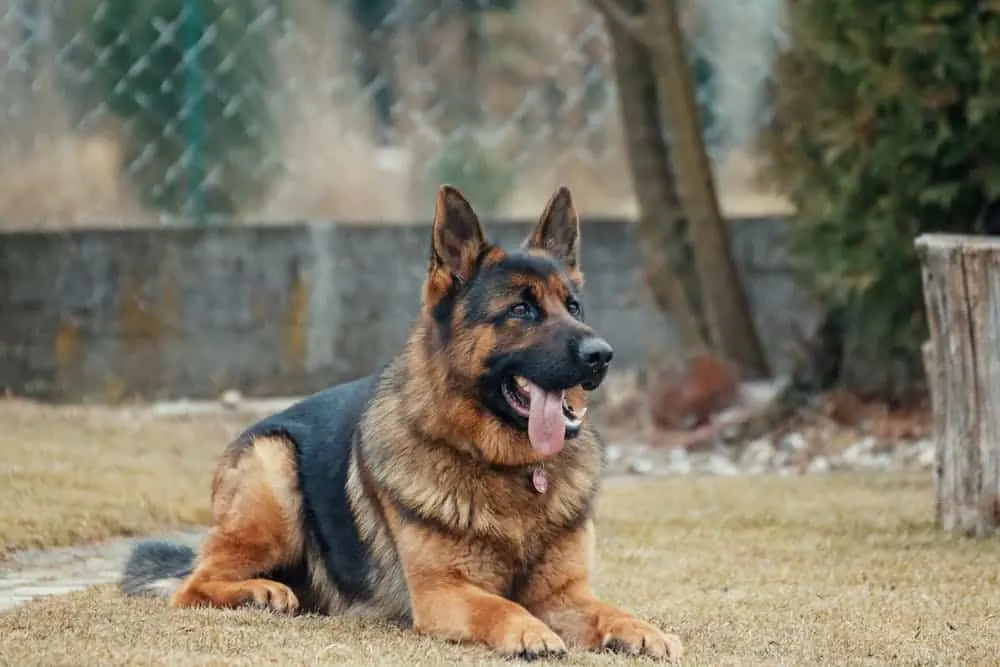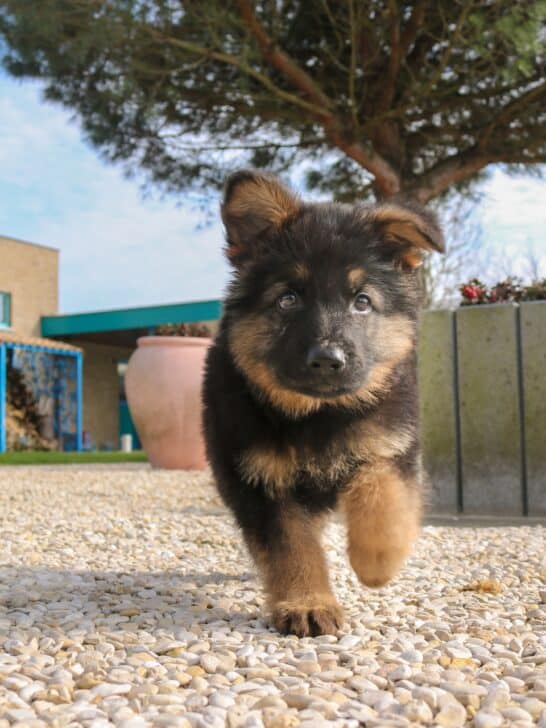Are German Shepherds Scary: What You Need to Know About the GSD Temperament
If you had to guess, what dog breed would you say is the most popular companion canine in America?
Did you guess the “German Shepherd?” Probably not, if you are reading this article, right?
But actually, the American Kennel Club (AKC) reports that the German Shepherd is the second most popular pet dog out of 195 registered purebred dog breeds in the United States.
Only the super-friendly Labrador Retriever has more fans than the GSD as a family pet.
At this point, you might genuinely be wondering – how scary could a German Shepherd possibly be if they are this popular? Let’s find out now.

Meet the German Shepherd Dog Breed
The German Shepherd dog breed line began in the 18th century in German. An officer in the calvary (horse brigade) of the German army decided to breed a dog that would be able to herd and protect livestock on long grueling cross-country drives.
This man’s name was Captain Max von Stephanitz, and he succeeded beyond his wildest dreams when he developed the German Shepherd. Once herding dogs were no longer in demand, the GSD found loyal fans in police and military work.
What does this mean for determining if the GSD is a scary dog or not? It means that this dog was bred to be protective by nature.
- The German Shepherd, when bred true to this dog’s genetic roots, will exhibit each of the following characteristics:
- Loyal and loving towards “their” people.
- Aloof and guarded with strangers (animals or people).
- High natural prey drive and defense drive.
- Extremely intelligent and capable of doing complex jobs independently.
- Fiercely focused when “on the job” and will work tirelessly for hours without a break.
Today, German Shepherd dogs are still a wildly popular choice for guard dogs, protection dogs, K9 dogs in the police force and the military, service dogs, search and rescue dogs, and therapy dogs as well as pet dogs (companion canines).
Do you see a common theme emerging as you read through this breed description?
German Shepherds, when properly bred, socialized, and trained, excel at discerning defense and protection. But they aren’t scary – unless they perceive there is a need to be!
When Might a German Shepherd Become Scary?
Right now, think of one time when you have felt threatened or scared. What made you feel that way? You were probably feeling that way because of something or someone around you, right?
Maybe you were just scared because you heard a weird sound in the house while you were home alone.
Or perhaps you got scared when you were walking down the street and saw someone turn around like they were starting to follow you.
Or maybe you felt scared when suddenly it thundered very loudly outside and you didn’t expect it.
The same basic reasons that make you feel scared are the same basic reasons why your German Shepherd might feel scared.
When a dog – any dog – feels scared, they typically react in one of three ways:
- By becoming aggressive.
- By becoming submissive.
- By becoming alert and defensive.
Interestingly, these are the same three main methods people generally exhibit when they are scared. Now let’s look at each method more closely.

Aggressive or submissive
German Shepherds are traditionally bred to exhibit very strong defensive drives. A defensive drive is exactly what it sounds like – a drive to defend.
A German Shepherd’s drive to defend is generally focused on self-defense or defense of their charge. Their charge might be a herd of sheep or you, their owner, or a platoon of soldiers or something else they have been trained to defend and protect.
But when a GSD has not been trained in how to use their natural defense drive, what often comes out instead is either aggression or submission. Aggression and submission are actually two sides of the same coin and both arise from feelings of fear.
Why might a German Shepherd express their defense drive as aggression versus submission?
Some German Shepherd breed lines stay more true to the original GSD breed developed by Captain von Stephanitz. As this German Shepherd breeder and kennel explains, the European breed lines are still bred for working traits rather than appearance.
Because most families want a loving, friendly, approachable pet dog, the American and German show lines are less likely to exhibit a strong defense drive and more likely to learn easily how to tolerate strangers (like visitors to the home).
These dogs are less likely to receive adequate training to manage their defense drive when they feel threatened, are thus are more likely to lapse into aggressive or submissive behavior in the face of threats.
Many people find aggressive behavior in a dog very scary indeed! But typically this happens when a dog of any breed has not been trained in how to cope with threats.
Alert and defensive
German Shepherds are a popular choice not just for family pets but also for personal protection and guard dogs.
People choose this dog breed because it is well known that the GSD was developed with these traits in mind.
A smart, aware GSD owner will make sure their German Shepherd has been well trained in basic obedience and then in guard and protection duty so they know how to spot and deal with genuine threats.
A well-trained GSD is much less likely to exhibit “scary” behavior because these dogs will learn how to reserve aggressive or defensive behaviors only for true threats.
What a Scary German Shepherd Dog “On the Job” Looks Like
With names like Rin Tin Tin, Won Ton Ton, Max, Ace, and Danny Boy, German Shepherd movie stars have helped to endear this breed to the general public.
But not everyone is a dog lover. Some people are genuinely afraid of dogs. Even if you aren’t afraid of dogs in general or German Shepherds in particular, you might be after watching this video.
The German Shepherds in this video are highly trained members of elite military units, including Seal Team 6, the team that took down Osama Bin Laden. As you can see, these dogs are truly ferocious.
But when you watch closely, you will also see that the GSDs in training did not react in any way until their handler gave them the right command. This is a perfect example of a German Shepherd who is trained to harness their defense drive for useful purposes.
In other words, these dogs are not scary when you first meet them. In fact, each dog in the video seems like your average friendly German Shepherd pet dog until the training begins.
Even after the man in the suit shows up, the GSD does not react until the handler/trainer indicates it is time. Then, once the training exercise ends, the dog goes right back to being a friendly and calm dog.
In this video, it is easy to see why some people think German Shepherds are really scary. But outside of military operations, if anyone encounters a German Shepherd acting this way, there are probably only two valid reasons:
- The dog is being justly provoked by a legitimate threat and is responding correctly by behaving in an intimidating and aggressive manner.
- The dog is not well trained and is feeling fearful or threatened and is responding with aggression as a result.

The German Shepherd Dog’s History and Background Can Influence Temperament
Dog lovers who work in German Shepherd dog rescue already know that a scared GSD can be a scary GSD.
Many dogs are rescued because they are abused, abandoned, neglected, or mistreated in some way. Whether the dog is rescued from a puppy farm, a hoarding situation, abandonment, or other types of abuse, fear is a natural by-product of these experiences.
Similarly, when a German Shepherd proves to be “too much dog” for an inexperienced or absentee owner and gets relinquished to a shelter, that dog will suffer. GSDs form very strong bonds with people and are very sensitive to abandonment.
If you have rescued a German Shepherd or are thinking about adding a rehomed GSD to your family, take the time to learn as much as possible about the dog’s history and background before making a commitment.
Even friendly, well-bred, healthy and well-socialized GSD puppies can be a serious handful to train! A traumatized adult German Shepherd that is rehomed is likely to come with special socialization and training needs.
The more you can learn about the German shepherd dog breed before you make a commitment to one of these dogs, the less likely you are to ever see scary behavior come from your dog towards you.
And if your GSD behaves aggressively towards anyone else, you can trust that a genuine threat exists and your dog is simply doing what they have been trained to do – protect you




















